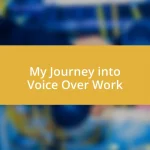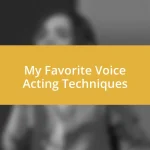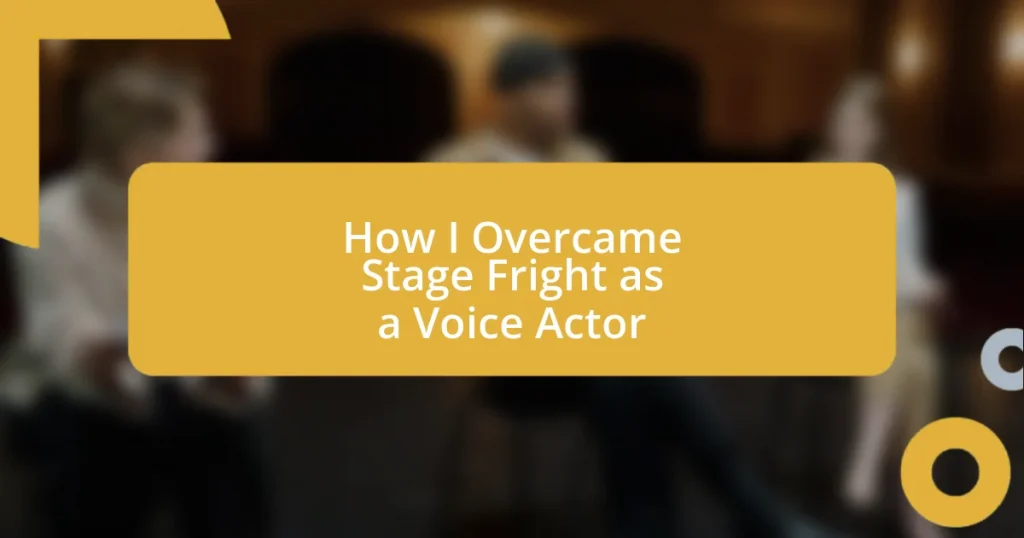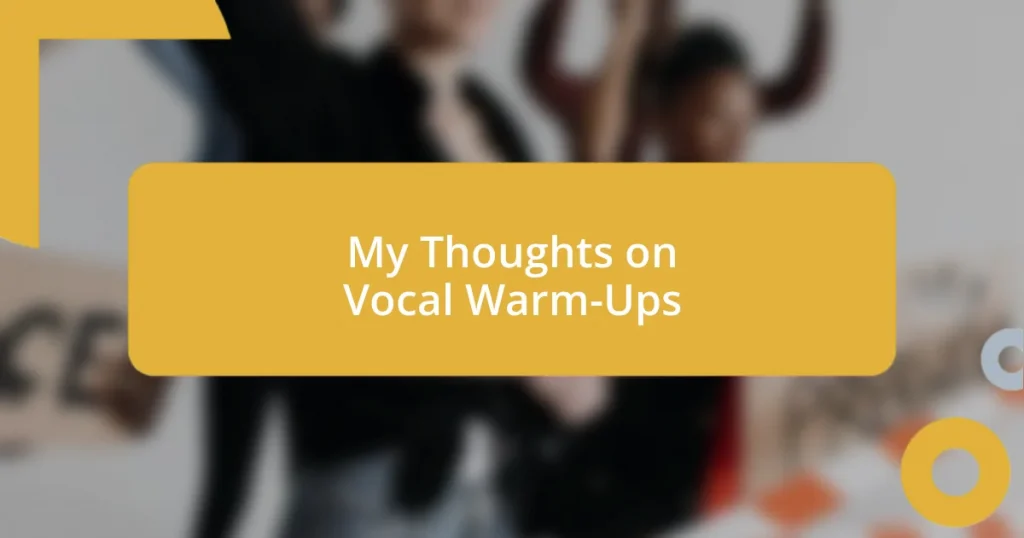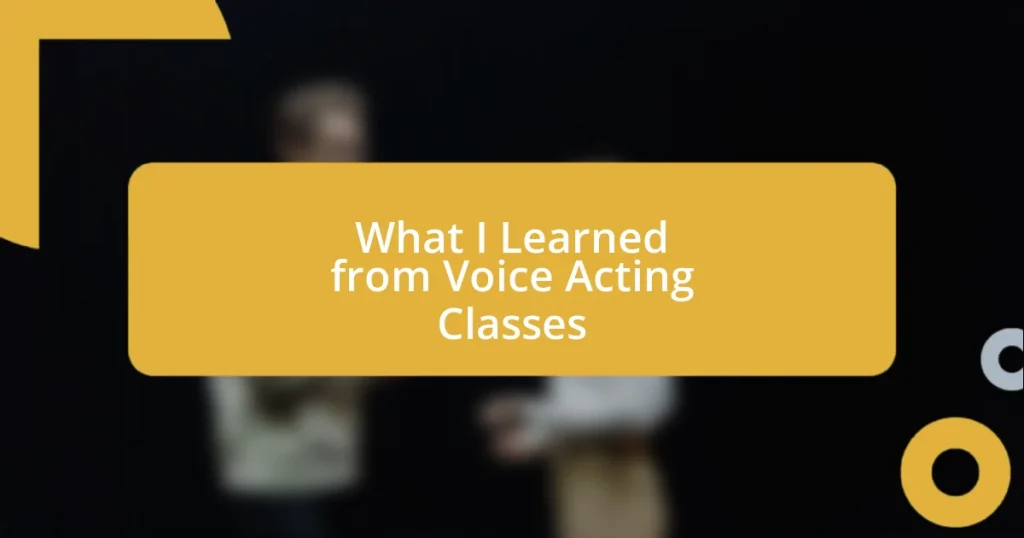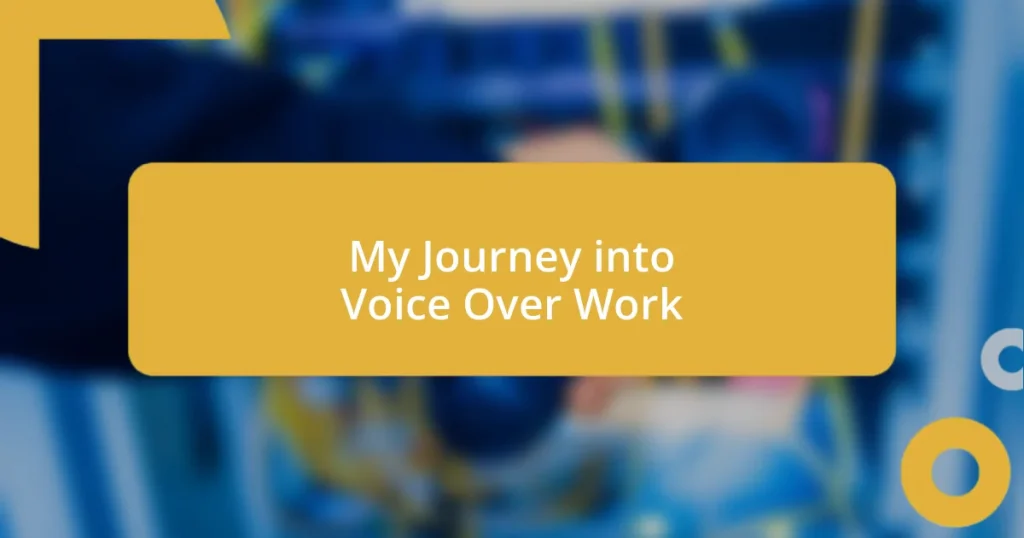Key takeaways:
- Stage fright is often caused by fear of judgment, high expectations, and lack of experience, which can lead to physical symptoms like increased heart rate and nervous tension.
- Techniques such as deep breathing, visualization of success, and practicing with supportive peers can significantly reduce anxiety and build confidence.
- Consistent practice, networking, and seeking constructive feedback are essential for sustaining long-term success in voice acting and overcoming stage fright.
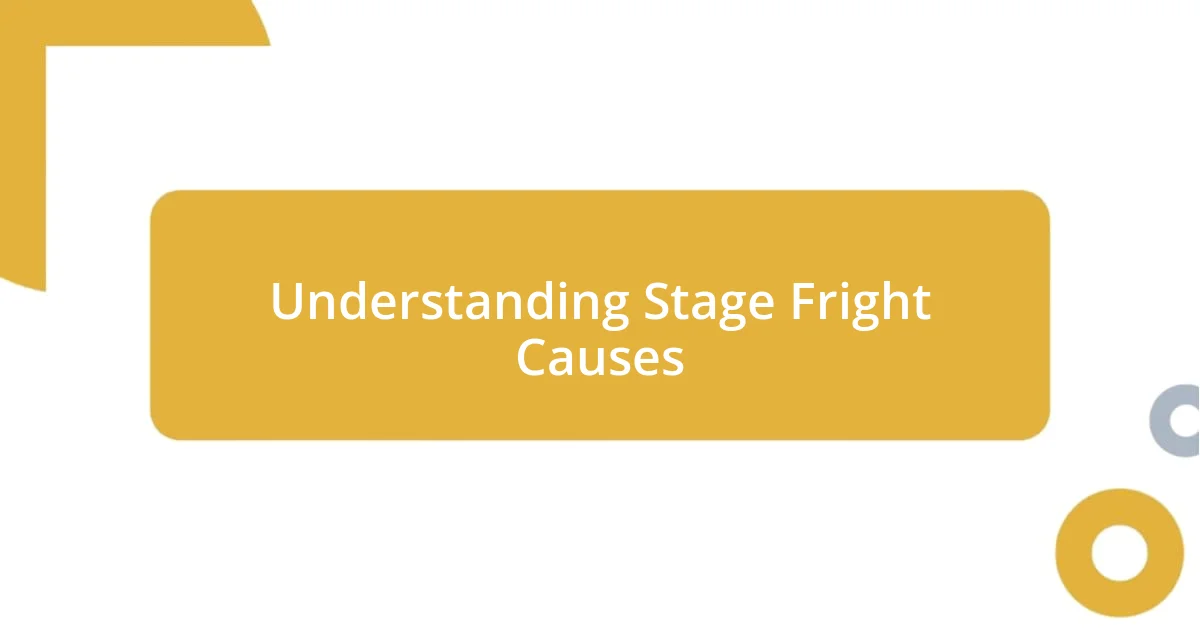
Understanding Stage Fright Causes
Stage fright often stems from a deep-seated fear of judgment or failure. I remember my first audition; my stomach twisted in knots as the thought raced through my mind: “What if they don’t like my voice?” That haunting worry can manifest physically, leading to sweating, shaky hands, or even a blank mind when it’s time to perform.
Another significant cause of stage fright is the pressure to meet high expectations, whether they’re self-imposed or coming from external sources. I recall feeling a wave of dread at the thought of disappointing my peers and mentors. It made me question my abilities, and I wonder if many of you relate to that kind of pressure. How do you push through when it feels unbearable?
Moreover, lack of experience can amplify anxiety. In my early days as a voice actor, I often felt overwhelmed in unfamiliar settings. I used to think about how every seasoned actor started somewhere, but it didn’t lessen my fear. What I learned is that it’s okay to feel vulnerable; understanding that it’s a common struggle can often help ease the burden.
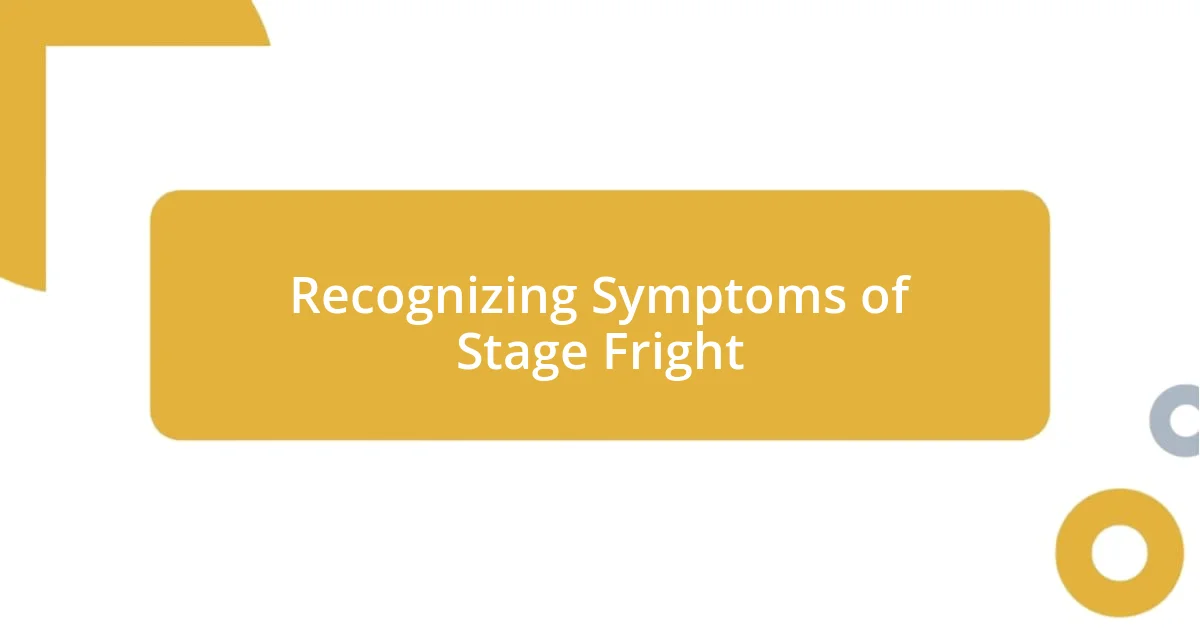
Recognizing Symptoms of Stage Fright
Understanding the symptoms of stage fright is crucial for overcoming it. When I first started facing audiences, I didn’t recognize the signs that my body was throwing at me. My heart would race, my mouth would feel dry, and I’d feel a strong urge to run away. These symptoms can escalate quickly if not acknowledged, turning a minor discomfort into an overwhelming panic.
Here are some common symptoms to look out for:
– Increased heart rate
– Sweaty palms or forehead
– Nausea or stomach discomfort
– Tension in muscles
– Nervous laughter or fidgeting
– Blank thoughts or memory lapses
Being aware of these signs can help you address your stage fright head-on before it spirals out of control. I remember once, during a workshop, my voice cracked mid-sentence, and I felt trapped in my own anxiety. Recognizing those physical reactions served as a wake-up call that helped me tackle my fears more effectively.
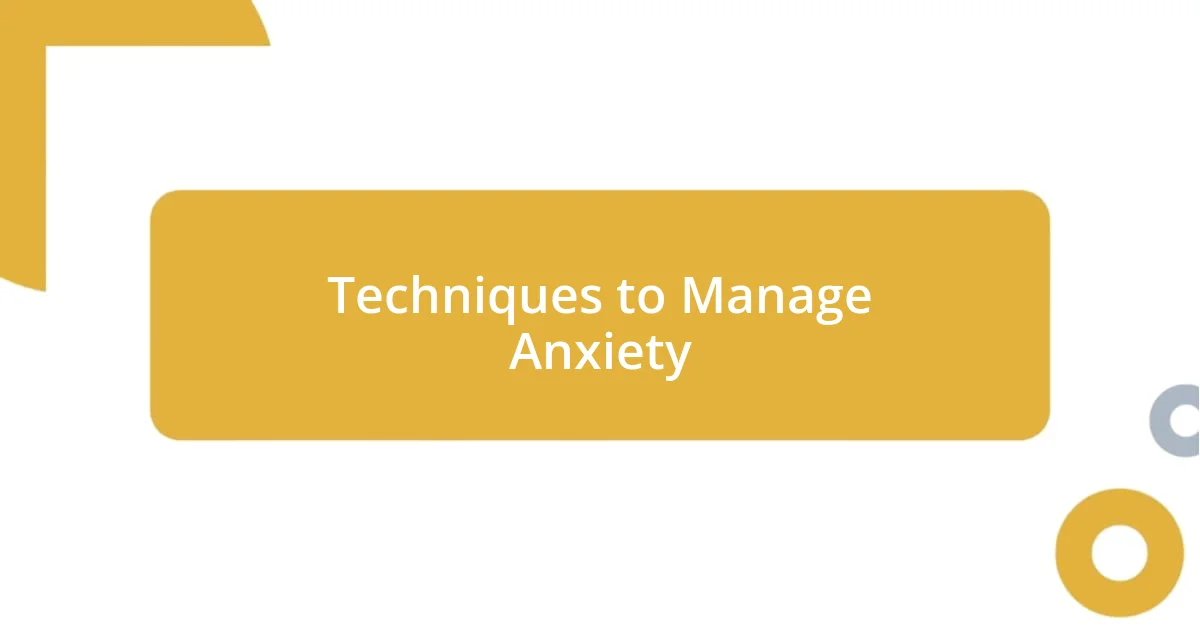
Techniques to Manage Anxiety
When it comes to managing anxiety as a voice actor, I’ve found that deep breathing exercises can be a game changer. I remember feeling my nerves bubbling just before a crucial recording session. Taking a moment to inhale deeply through my nose, hold for a few seconds, and exhale slowly helped ground me in that moment. It’s amazing how such a simple technique can reset your mind and body, helping you to approach your performance with clarity.
Visualizing success has also played a huge role in my journey. Before stepping into the booth, I close my eyes and picture myself delivering the lines perfectly, hearing the applause ring in my ears. This positive imagery doesn’t just create a buffer against anxiety; it cultivates a mindset of confidence. I often ask myself, “What does it feel like to be completely unbothered?” and that visualization allows me to embody that feeling.
Another effective technique I’ve employed is practicing in front of a small, supportive group. For instance, inviting friends to listen to my rehearsals in a relaxed setting transformed my fear of judgment into a shared experience. I’ve learned it’s okay to be vulnerable with others, and that collective support can help alleviate the burden of anxiety immensely. This approach not only builds confidence but also fosters connections that make future performances feel less daunting.
| Technique | Description |
|---|---|
| Deep Breathing | Calms the mind and body, providing a moment to reset. |
| Visualization | Imagines a successful performance to build confidence. |
| Practice with Support | Rehearsing in front of friends transforms fear into shared experience. |
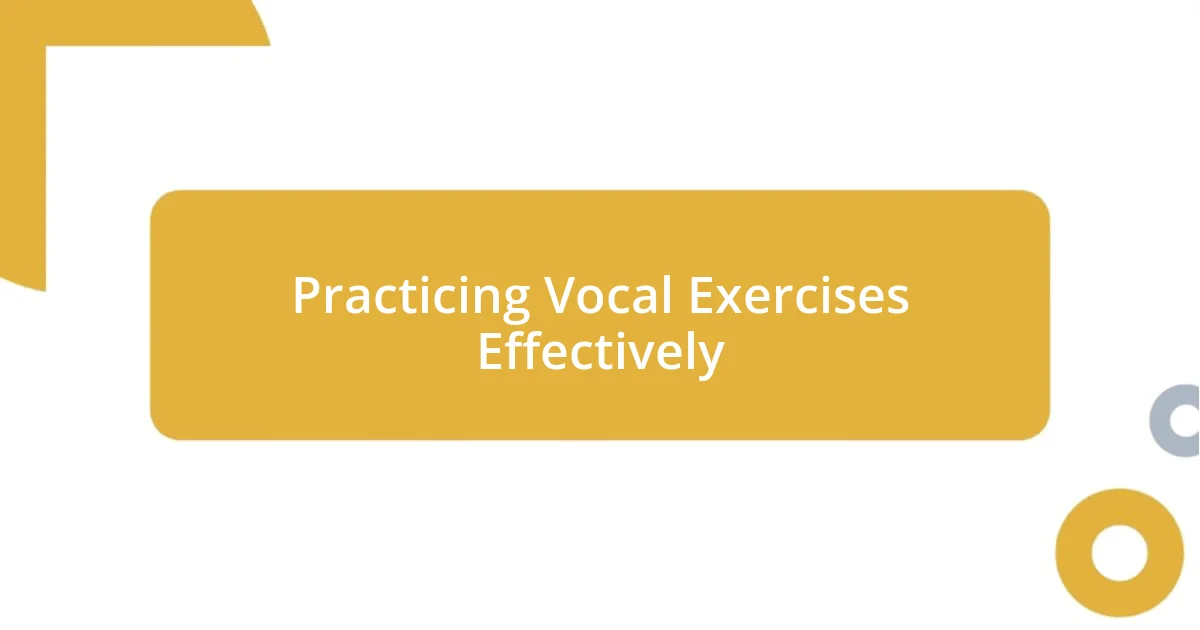
Practicing Vocal Exercises Effectively
Practicing vocal exercises effectively involves creating a routine that resonates with your unique voice. I remember the first time I tried tongue twisters as a warm-up. It was more than just a way to loosen up; it felt like giving my voice a workout. Each session became an opportunity to discover the different ranges and tones I could produce. Have you ever noticed how your voice can feel different each day? Consistency in practice helped me navigate those fluctuations with ease.
Incorporating breathing exercises into my vocal practice was transformative. I often find myself combining deep inhalations with vocal scales. This not only improves my airflow but also calms my nerves. The connection between breath and voice is undeniable. When I remember to ground myself with intentional breathing, I feel more present and less prone to anxiety. Isn’t it fascinating how something so simple can unlock such potential?
I also emphasize the importance of recording my practice sessions. Listening back has been invaluable in understanding my vocal nuances. Early on, I recognized that some pitches sounded strained, which led me to adjust my technique. Plus, I find it motivating to track my progress over time. Have you ever considered how much growth you can discover by simply hitting “record”? Each playback is a learning opportunity that fuels my confidence, especially when I hear the improvements I’ve made.
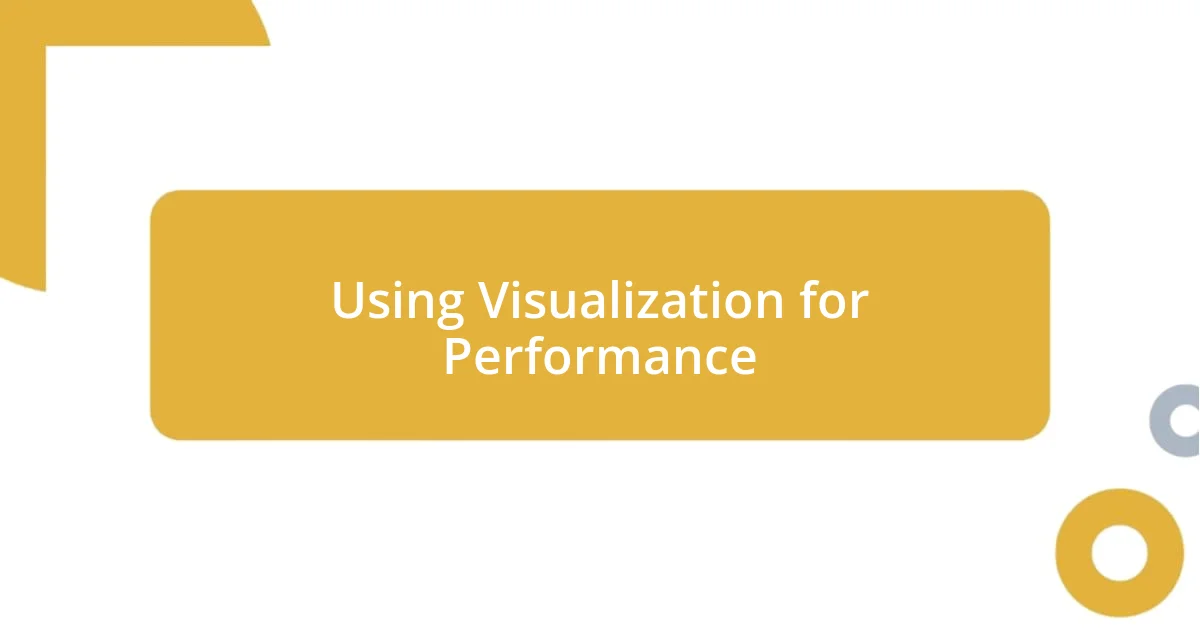
Using Visualization for Performance
Before I start any recording session, I often engage in vivid visualization to set the right tone for my performance. I imagine the entire scene in my mind: the setting, the character’s emotions, and even the audience’s reactions. This mental imagery is not just about envisioning success; it’s about feeling it. I can almost hear the laughter or applause as I embody my character, which creates a powerful sense of confidence. Have you tried picturing your success in this way? It’s incredible how it alters your energy going into a performance.
I remember one particularly tough recording where I felt overwhelmed by doubt. Before stepping into the booth, I took a few moments to visualize myself delivering the lines flawlessly, feeling every emotion of the character. As I closed my eyes and envisioned the scene, I felt a wave of calm wash over me. Suddenly, I wasn’t just an actor; I was the character. This technique transformed a moment of fear into a powerful performance. It’s a reminder that the mind can be an ally, helping us conquer stage fright.
There are times when I still battle nerves, even after years of practice. In those moments, I also visualize the worst-case scenario: stumbling over words or forgetting lines. But then I remind myself: what if it goes perfectly? This balance between acknowledging fear and redirecting focus toward success has been key in my journey. It’s a simple yet profound shift that helps me step into my power as a voice actor. Have you found ways to balance your fears with positivity? It’s an ongoing process, but visualization has made all the difference for me.
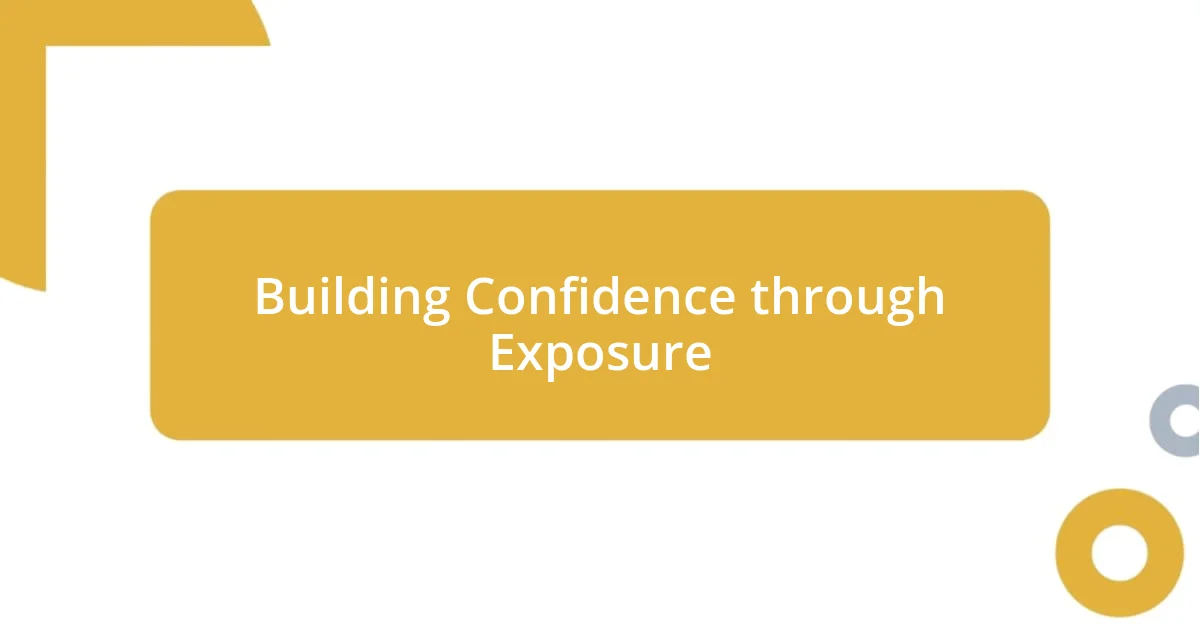
Building Confidence through Exposure
Building confidence as a voice actor often hinges on embracing exposure. I recall my early days in voice acting, where I forced myself to perform in front of friends and family. At first, it felt awkward, but each time was a step forward. Have you ever faced a similar challenge? With every recording and feedback session, my comfort grew, transforming panic into enthusiasm.
Participating in open mic nights was another eye-opener for me. The thrill of standing in front of an audience, knowing they were there to listen, shook the nerves yet ignited my excitement. Each performance helped me realize that the stage isn’t as intimidating as I once thought. The applause, even if polite, felt rewarding. There’s something about sharing your voice publicly that can turn anxiety into a sense of belonging—have you ever experienced that rush?
Gradually, I started seeking out more collaborative projects, teaming up with fellow voice actors. The first time I joined a small ensemble, I was terrified! But the camaraderie we built offered a safety net. I learned that exposure doesn’t have to be faced alone; it can be a communal experience. When we share our fears and triumphs, it enhances our confidence collectively. Isn’t it remarkable how support can shift our perspective and turn nerves into collaboration?
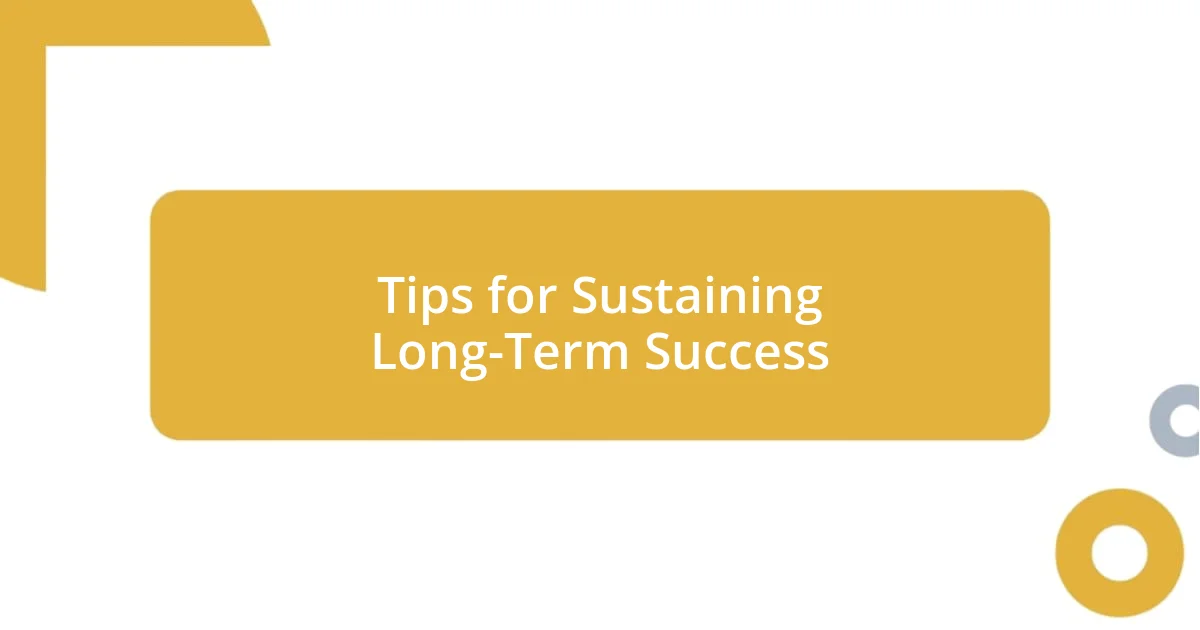
Tips for Sustaining Long-Term Success
To sustain long-term success in voice acting, I’ve found that consistent practice is vital. I dedicate time each week to hone my skills, whether that’s through reading scripts aloud or experimenting with new character voices. Have you set aside a specific time for practice in your routine? It’s amazing how even just a few hours a week can keep your skills sharp and your confidence high.
Networking is another essential piece of the puzzle. I remember attending industry events where I could connect with other voice actors and producers. Initially, the thought of mingling terrified me, but each conversation opened doors I never expected. Have you thought about how those connections could enhance your career? Building relationships in this field not only leads to opportunities but also fosters a supportive community that understands the unique challenges we face.
Lastly, seeking feedback is crucial for growth and resilience. I often reach out to trusted colleagues for critiques on my performances. At first, I was nervous about their honesty, but I discovered that constructive feedback is a goldmine of insights. Have you considered how feedback can elevate your work? Embracing it has been transformative; it helps me refine my craft and reaffirm that I’m on the right path. Remember, staying open to learning is key to thriving in this dynamic industry.


